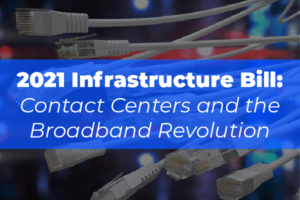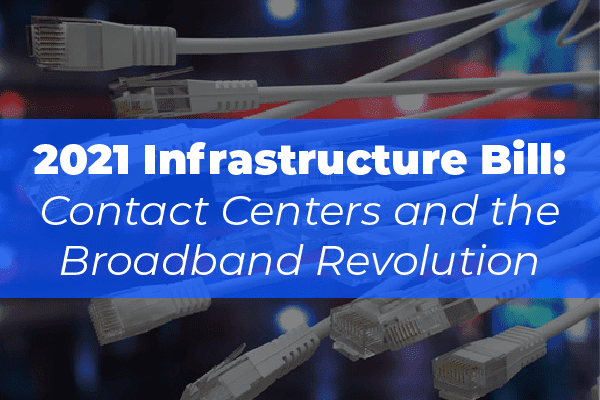As the Senate voted last week, Aug. 24th, to pass the Infrastructure Investment and Jobs Act (a $1.2 trillion bipartisan infrastructure bill), we are one step closer to the final approval of the new Infrastructure Bill. This once-in-a-generation investment includes $550 billion in new federal investment in America’s infrastructure. The $1.2 trillion figure comes from including additional funding normally allocated each year for highways and other infrastructure projects.
This time, among some of the more traditional development projects such as railroads, power grid, water infrastructure, public transit, etc., the bill directs a staggering $65 billion towards expanding and improving the internet infrastructure nationwide. Let’s see what are the two main goals of this investment and how can this impact the future of the contact center industry as a whole.
The Road to Universal Access
 One of the largest and most notable pieces of the bill is the $65 Billion dedicated to high-speed internet, which is supposed to increase the geographical internet penetration nationwide and improve broadband speed in remote areas where internet latency has been an issue for a very long time.
One of the largest and most notable pieces of the bill is the $65 Billion dedicated to high-speed internet, which is supposed to increase the geographical internet penetration nationwide and improve broadband speed in remote areas where internet latency has been an issue for a very long time.
It is estimated that in the US there are close to 30 million people that have no internet access or the speed is too low to sustain a decent connection with modern web services. Another issue tackled by the bill is the affordability of high-speed internet. It is estimated that almost 100 million Americans can’t afford a decent internet connection. The bill distributes $42 billion to expand internet access and $14 to increase internet affordability nationwide.
The Broadband Revolution and the Contact Center Industry
Beyond the obvious end goals of the bill to provide wider access to basic online facilities such as online schooling, healthcare services, employment, and business opportunities, the consequences of this initiative will have a deep impact on a host of other activities. Of course, the contact center industry is no doubt one of those niches that will be heavily influenced, in more than one way, by this so-called broadband revolution.
Evolving Consumer Behavior: As technology evolves, the communication behaviors of the new generations are constantly changing. It is well known that while boomers prefer calling over text, for millennials and generation Zs it is the other way around. And with wider internet penetration, it is easy to see why the future of communication lies with the new social media messaging platforms.
The Work-from-Home Revolution: A wider internet coverage will no doubt stimulate the work-from-home model for contact centers, as more and more people will have access to the right infrastructure and the necessary internet latency.
New Business Models: In the current status quo, most aspiring contact center businesses are forced to activate exclusively in or around large urban centers for two main reasons: 1. The immediate access to a large employee pool and 2. A faster internet infrastructure. However, the new Infrastructure Bill is about to change all this in favor of the more elastic and versatile cloud contact center model.
A Brighter Future for the Contact Center Industry
The contact center landscape is changing before our very eyes and this type of initiative is shaping a brighter future for the industry. It is in times like these when industries forge their path and direction for the next decades; when bold decisions have the potential to revolutionize the business model of contact centers for the mid- and long-term future.
If you want to take advantage of this unique momentum, NobelBiz might be your best bet. For the last 20 years, we’ve been reinventing contact centers across the globe in terms of communication infrastructure, telecom services, cloud hosting, state-of-the-art contact center software, applications, and much more.
Get in touch with one of our experts to book a discovery call and find out what are the steps to take your contact center to the next level…

Andrei is an experienced marketing professional specializing in propelling growth for both B2B and B2C companies. Proficient in streamlining marketing operations and enhancing lead and customer experiences through SEO and marketing techniques.







